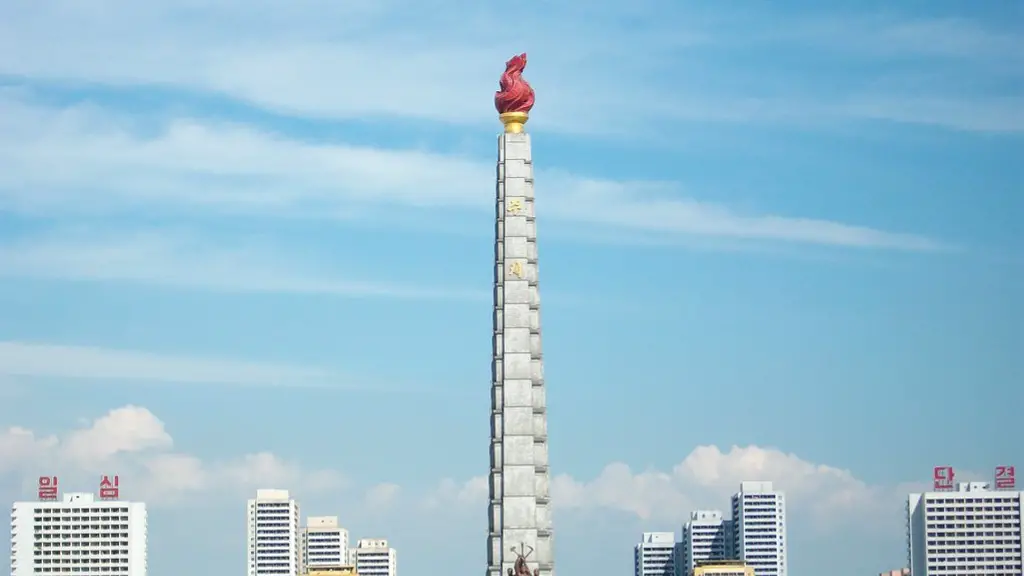Economic Impact
Bombing North Korea would be an economic disaster, both for the region and the world. Any conflict would undoubtedly affect energy markets, create an economic downturn in the region and in many parts of the world, and cause a global recession. Oil prices would spike, unemployment would increase, and international trade would suffer.
The South Korean economy, which is the 11th largest in the world, would bear the brunt of the economic damage of such a conflict. The South Korean stock market is volatile on its own, and any conflict would cause it to take a nosedive. South Korea is heavily reliant on exports and foreign investment, both of which would be severely impacted. The North Korean economy, meanwhile, would be crippled for generations to come.
The fallout from the bombing would be felt around the world. China, North Korea’s closest ally, could suffer severe economic repercussions, as would Japan, Russia and other countries in the region. Since the region is a major hub for shipping, the disruption of global trade would be considerable.
Perhaps most alarming would be the impact on global energy markets. Aside from the immediate disruption of supplies, there would be a long-term effect due to the massive destruction of oil refineries and other infrastructure. It is estimated that a conflict in North Asia would cause a 50% rise in oil prices – an economic shock that the world is ill-prepared to absorb.
Political Impact
The political impact of bombing North Korea would be wide-reaching and profound. The U.S. and its allies would likely suffer international condemnation, as the majority of the global community is strongly opposed to military action in North Korea. China and Russia would both protest strongly, and the UN Security Council would be hard-pressed to agree on a joint resolution.
The U.S.’s reputation in the region would also be damaged. Any military action against North Korea would be seen as a hostile and provocative act, and would lead to strained relations with countries like China and Russia. The consequences of such a conflict would be felt for many years to come, potentially leading to destabilization and increased tensions in the region.
In addition, North Korea’s fallback capability in the event of an attack would be severe. North Korea is believed to have stockpiled large quantities of chemical and biological weapons, and it is possible that they could launch a retaliatory attack on South Korea, Japan, or even the U.S.
Social Impact
The social impact of bombing North Korea would be devastating. Hundreds of thousands of lives would be lost, and millions would be displaced. Families would be torn apart, and the entire nation’s infrastructure, from hospitals to schools, would be destroyed.
The psychological impacts of a conflict would be immense. Refugees fleeing the North would experience tremendous trauma, as would those who remain in the country. In the event of a conflict, it is likely that North Koreans would turn to international aid organizations, many of whom are already stretched thin.
In addition, a conflict would have serious implications for freedom of information in the region. North Korea is notorious for its restrictive media policies, and any conflict could lead to further restrictions. This would be a set back for freedom of information, and could lead to a further breakdown in communication.
Environmental Impact
The environmental impact of a conflict in North Korea would be catastrophic. Any bombing would release vast amounts of toxic pollutants into the atmosphere, and the destruction of oil refineries and other infrastructure would cause significant ecological damage.
The risk of an oil spill, too, would be extremely high. North Korea has significant oil reserves, and if those reserves were breached there would be catastrophic consequences for the environment. Air pollution would increase, and water supplies would be contaminated. In addition, radioactive fallout from nuclear weapons would spread across the region, leading to long-term health and environmental damage.
The worst part of it all is that such damage is often irreversible. Entire ecosystems could be destroyed, and species could become extinct due to the destruction caused by a conflict. In addition, the long-lasting implications of the conflict, such as reduced air quality, could have devastating consequences for future generations.
International Relations Impact
The bombing of North Korea would have a significant impact on international relations. The U.S. and its allies would be seen as aggressors, and their standing in the global community could suffer as a result. This could lead to increased tensions between the U.S. and its allies, and other countries in the region.
It would also isolate the U.S. from countries in the region, and make it a pariah in certain circles. North Korea has strong ties to China, Russia and other countries in the region, and those countries would be less likely to cooperate with the U.S. in the future. This could have serious consequences for global trade and geopolitics.
Furthermore, a conflict could lead to increased militarization in the region. Countries such as China and Russia may respond by bolstering their own military forces and increasing their presence in the region. This could undermine regional security and increase the risk of further conflict.
Regional Security Impact
Strategic ImplicationsBombing North Korea would undoubtedly have strategic implications, both for the U.S. and its allies. Such a conflict would likely lead to increased militarization in the region, and increased tensions between the U.S. and its allies, and China and Russia. It could also lead to a breakdown in global trade, and could have severe economic consequences for the region and the world.
The conflict would also have serious implications for U.S. and allied security. A conflict would lead to increased risk of a nuclear confrontation, and a potential for weapons of mass destruction to fall into the hands of terrorists. It would also undermine regional security and stability, and could have dire consequences for the region.
Finally, a conflict would have significant implications for global politics. Such a conflict would be seen as a hostile and provocative act, and could put the U.S. at odds with many of its allies. In addition, it could lead to increased isolation for the U.S., and a breakdown in communication with countries in the region.
Policy Implications
The bombing of North Korea would have serious policy implications, both domestically and internationally. Any conflict could lead to an increase in military spending and an increase in military personnel, both of which could have long-term implications for government budgets. It could also lead to an expansion of security measures, such as increased surveillance and the deployment of more troops to the region.
Internationally, the conflict could lead to increased hostility between the U.S. and its allies, and countries in the region. It could also lead to a breakdown in communication and a deterioration in relations with important allies. This could lead to further tensions and an erosion of trust between countries.
In addition, such a conflict could lead to a breakdown in international cooperation, as countries in the region become increasingly wary of U.S. foreign policy. This could lead to a breakdown in global trade, and a decrease in the flow of money and resources to the region. It could also lead to increased regulation and surveillance, as countries seek to protect themselves from the threat of a conflict.

